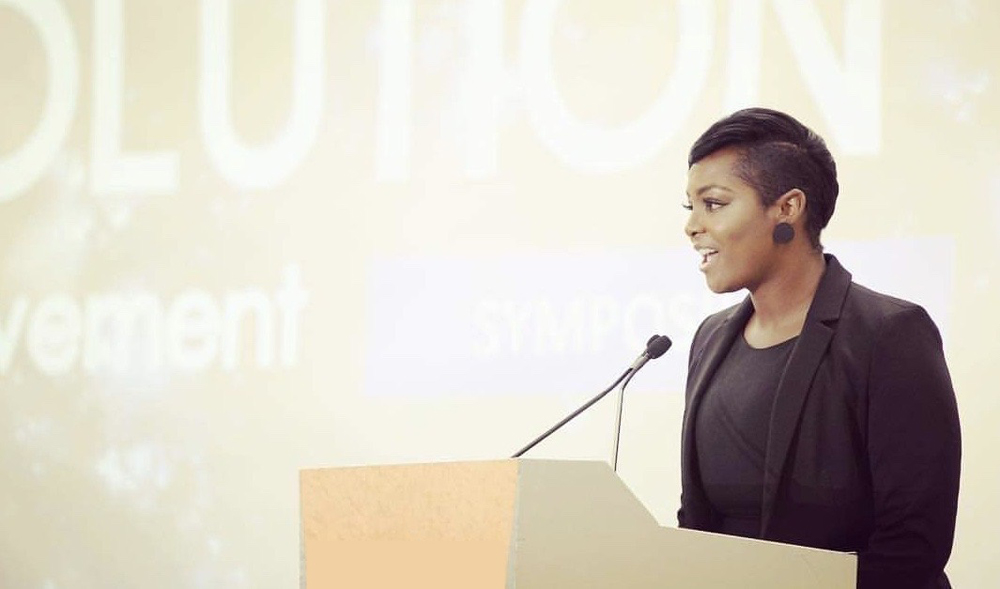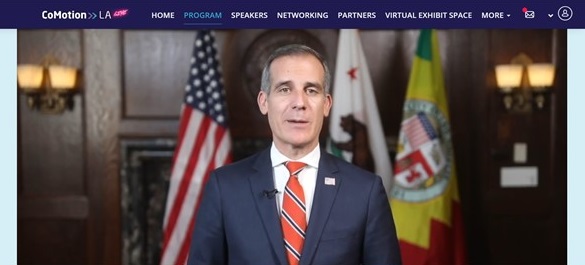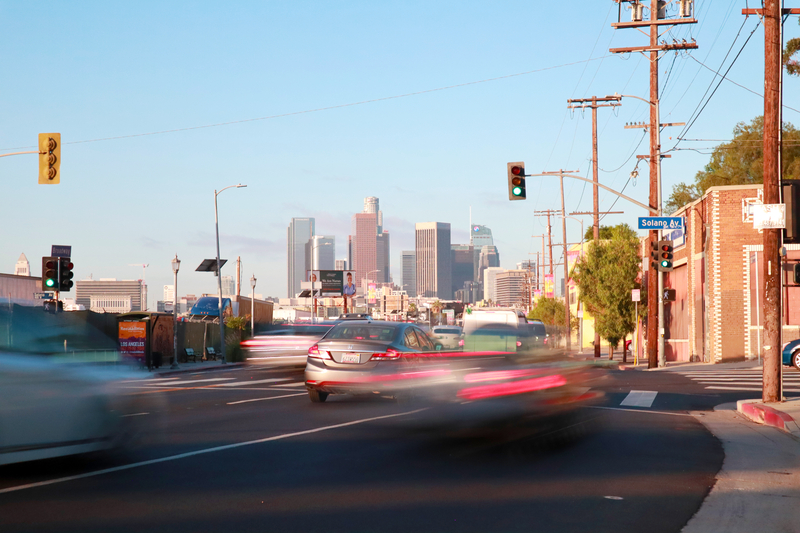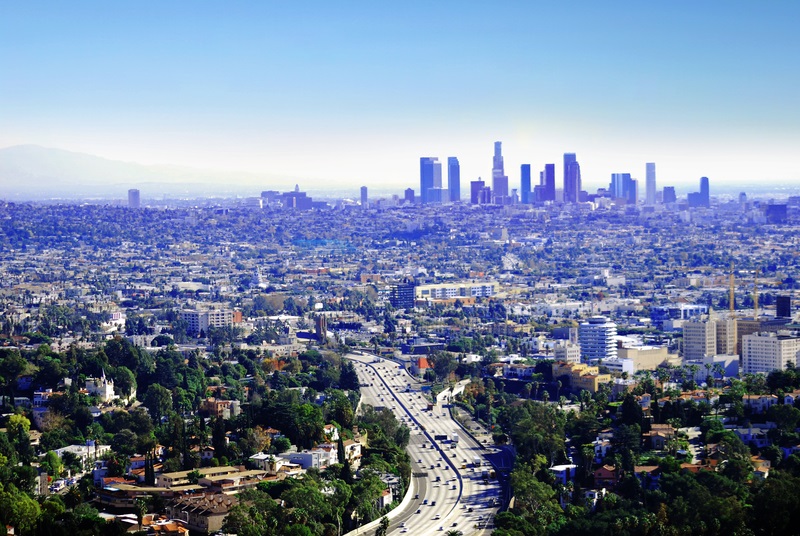
Los Angeles is “the city which launched car into the world”, according to John Rossant, founder of NewCities Foundation, as he opened November’s three-day CoMotion LA Live 2020 virtual event.
In keynote remarks beforehand, LA mayor Eric Garcetti called the city “the transportation technology capital of the world”.
LaLaLand is no stranger to hyperbole, but both of these statements have a ring of truth.
Rossant, who is also CEO of CoMotion, added: “We’re calling for a new deal for mobility.”
And it is this commitment which is at the nub of the current incarnation of LA – as an immense, gas-guzzling urban sprawl seeking to reimagine the way its people move around.
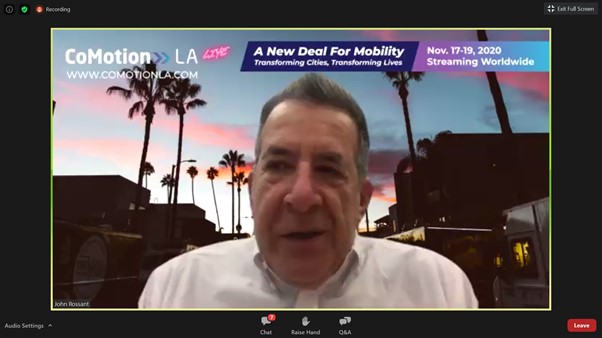
There’s a lot going on, including serious consideration of whether travel on LA County Metropolitan Transportation Authority (Metro)’s buses and trains should be free. That has the potential to affect 9.6 million travellers – nearly one-third of California’s population.
Congestion charging is also on the agenda – something that would have been unthinkable in LA’s heyday as a sunlit cathedral to the automobile. Metro’s board has also put serious money - $400 billion - behind an ambitious 30-year transport blueprint. There’s certainly no lack of ambition.
As Garcetti said: “We need to double down on our commitment to not only recover from this pandemic but not to return to what was before – reimagine, instead, our future. That means addressing the current cascade of crises and the ever-present threat of climate change together.”
For him this means developing an “all-electric, accessible and affordable” public transport system: “Transportation that puts equity front and centre, and is accessible to everyone.”
‘Global South’
Climate change, Covid-19 and new modes of mobility are not, of course, local issues and Rossant specifically welcomed online delegates from cities of the southern hemisphere, the ‘Global South’, to CoMotion LA Live. “The majority of the world’s urban citizens live in cities of the south,” he pointed out.
It is critical to ensure the benefits that accrue from developments in sustainable mobility apply to them too, he said - and as part of this Rossant announced the launch of the Global Partnership for Informal Transportation.
These are the networks of shared transit – such as minibuses – which are not official public transport but nonetheless help literally millions of commuters in emerging economies get to work, giving them the basic freedom of movement which allows them to improve their economic situation.
“It will focus on ways to both decarbonise these informal networks and to capitalise on new technologies which can truly improve these networks,” Rossant explained, and will include partners such as WhereIsMyTransport, which has already done a lot of work to map the networks.
The new organisation plans to establish a database to continue this work, while also bringing together leading players, technology entrepreneurs, researchers and innovators.
It will be led by newly-appointed executive director Benjamin de la Peña, former chief of strategy and innovation at the Seattle Department of Transportation.
Other mobility partners include NewCities Foundation, Agile City Partners, CoMotion, United Nations Development Programme and Transforming Urban Mobility Initiative.
Thoughts at the conference naturally turned to the recent US election. “Clean, affordable, and accessible public transit” is part of the Democrats’ proposed Green New Deal, and president-elect Joe Biden’s past as a ‘super-commuter’ was generally considered to stand the mobility sector in good stead. As a senator, he famously commuted from his home in Wilmington, Delaware, to Washington, DC, every day via Amtrak.
Although detail of exactly what he will do in office is relatively sketchy, his putative transport plan includes an investment of $1.3 trillion over 10 years in infrastructure, with $50bn in the first year for highway repairs. The money is welcome – although future mobility is going to require more commitment to new technology.
Transit equity is certainly part of the mix as well, with $10bn over 10 years proposed for transit projects serving poorer areas with limited transport options. Biden is also a fan of electric vehicles and wants to see a huge expansion in charging infrastructure.
Good choices
Hilary Norton, chairwoman of the California Transportation Commission and executive director, FastLinkDTLA, welcomed a Biden presidency, suggesting that it was likely to lead to ‘good choices’.
She added that Biden addressing Covid, health and transport might point up one of the few benefits of the coronavirus pandemic – namely the way it encourages people to ‘do the right thing’ in order to protect other people. “We’ve been told our behaviour affects others but now we’re seeing it in real time,” she suggested.
She suggested that the Federal government should “infuse transit systems with a shot in the arm so we can get back to normal”.
Initiatives such as managed lanes and road pricing would also be part of the mix, along with electric vehicle car-share and micromobility, Norton said, plus the advances of 5G – all things to take away people’s reasons for not getting involved.
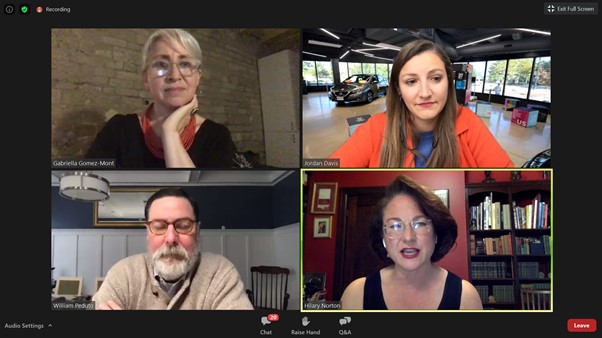
In California, which has an ageing population, there must also be an emphasis on safety. An older person’s trip on transit does not start when they get on a bus or train, it starts when they leave their house. She mooted the idea of transit ‘ambassadors’ “like greeters in stores”, to help travellers feel “safe and accompanied”; and suggested this might be important for the experiences of other groups, such as women and children.
But Jordan Davis, executive director, Smart Columbus Partnership, pointed out: “It’s going to be a challenge to get people feeling safe in any shared mode.”
Although transportation agencies have done good work responding quickly to the pandemic with an emphasis on cleaning, adjusted routes and contactless payment, there was a requirement to recognise that travel patterns have changed.
“Customers’ needs and perceptions are changing,” she continued. “We need to start back really listening and not making any assumptions about what people need.”
While essential workers who do not have any option but to use public transport are on it, many others are either homeworking or using their cars: a Biden ‘build back better’ narrative which looks at inclusion and diversity therefore has potential to make an impact.
Action focus
She believes the Biden administration has the potential to help create a new transportation system: “Leading from the sustainability lens, with new jobs, the economic impact, transitioning to a fully electric network – that’s pretty radical.”
But there are significant challenges.
“Mobility is the great equaliser for the 21st century,” she went on. “How do we create ‘10-15-minute cities’, especially in the MidWest where we have such substantial urban sprawl? How do we create opportunity closer to where our residents live? How do we create equitable relationships between where your jobs are and how people get there?”
For William Peduto, mayor of Pittsburgh, the focus must be on action. “It starts now,” he insisted. “We shouldn’t be waiting for a one-size-fits-all transportation plan to come out of Washington.”
He is one of eight mayors in the Ohio Valley region who have clubbed together to present an economic strategy to meet the Paris Agreement carbon reduction goals. A Biden White House is expected to return the US as a signatory to the agreement which the country under Donald Trump has just left.
Cities and regions should be developing local plans, thinks Peduto. “There are great things happening at local level,” he went on. “Cities and partnerships are starting to reimagine what can be done.”
He sees the city as an “urban laboratory to create the next model of transportation”. He pointed out that he “watched my city die” in the 1980s as steel mills closed and people left Pittsburgh. Yet now it has become a testbed for new technologies such as driverless vehicles.
“How could Pittsburgh become the ‘autonomous city’?” he wonders. “Maybe the best way Federal government can help is to listen.”
At the opening of the conference, Matthew Petersen, president and CEO of LA Cleantech Incubator, commented: “The work ahead is enormous, but the future’s bright.” That sounds about right.




